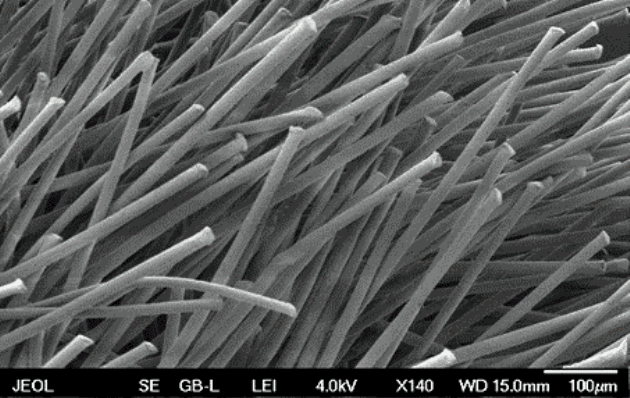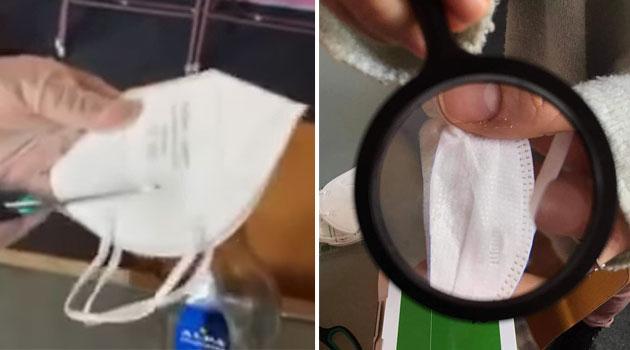Czech Internet flooded with fake news alleging parasites are infesting items now mandated by the Government, such as antigen tests

The Biology Centre of the Czech Academy of Sciences is refuting a lie that has been spreading through the Czech Internet with the aid of videos and other hoax materials alleging that parasites have infested the swabs that come with antigen tests. According to the findings of scientific researchers, there are no parasites to be found in or on such items.
Scientists from the Academy of Sciences’ Electron Microscopy Laboratory have shed light on the falseness of the claims making the rounds on social media. They are responding to posts in which a video with shots from a regular microscope are purporting to show the tip of a swab used to take nasal samples to test for the presence of the novel coronavirus.
The hoax alleges that black threadlike structures can be seen on the photograph taken of a sample swab under a microscope and claims they are parasites that will crawl through our noses right into our brains when we take the samples. Scientists from the Biology Centre have posted the following information about those false allegations to their website: “A staff member of a firm entrusted with the task of arranging the process of testing for their employees contacted us for assistance. The assignment was not an easy one – to quickly find antigen tests for a reasonable price, to set up a system of testing and announcing the test results, and to fine-tune a million other details. However, he had not counted at all on one barrier that proved to be rather essential. He did not count on his employees’ fear of the testing, a fear that had been prompted by a video allegedly ‘showing parasites’ on the tips of the sample swabs.”
Not parasites, but the bristles of a miniature brush
“Because we have the best technology for observing the micro-world, and many years of experience in discovering the world around us that is invisible to the naked eye, we decided to check a sampling swab. First we looked at one under a regular microscope and then we looked at it through a JEOL 7401F scanning electron microscope. As the photographs taken with those microscopes demonstrate, the bristles at the end of the sampling swab are actually a perfect miniature brush. There are no parasites there, not spherical ones and not thread-shaped ones!” the scientists posted online.
“We were surprised by the sterility of the swab, because the micro-world is full of bacteria, mold spores, pollen and an inexhaustible amount of fragments and fibers, so the absence of such things is unusual and demonstrates what the requirements are for the purity of the material used for close contact with the mucous membranes of the nose,” says Jana Nebesářová of the Electron Microscopy Laboratory. “In any event, if you were to rub those little bristles anywhere else other than inside your nose, it is certain that this miniature broom would capture a great deal of micro-garbage that could then look like miniature interlopers or parasites.”
The truth, however, is that a sterile swab for taking a sample from your nose, when it is first unwrapped, has nothing living on it, and that includes the parasite that is so frequently being discussed on social media right now, Vlasovec mízní (Wuchereria bancrofti). “The larva of a Wuchereria bancrofti measures, at the most, approximately 0.3 mm in length, and there is no way that corresponds to the size of the fibers that are being shown in many of these videos on the Internet. What’s more, such larvae are carried just by certain kinds of mosquitoes when they draw blood, which is how such larvae might access a human being’s circulatory system. The larvae would then grow and settle in the person’s lymph nodes, where they would mature and cause blockage, which would then lead to the development of the disease called elephantiasis, during which different parts of the body increase in size enormously. What is being shown in these videos is clearly not Wuchereria bancrofti. I would appeal to people’s common sense,” said Štefan Balog, a graduate of the Faculty of Life Sciences at Charles University in Prague who currently is the manager of the ROMEA organization’s scholarship program.
“These hoaxes that are being disseminated are of no aid to society when it comes to getting us out of the situation we are in. For that reason, please, maintain your cool, try to find more out about an issue first before you share it with others,” Balog called on his fellow Internet users; the Czech fact-checking website Manipulátoři.cz has been debunking the disinformation and hoaxes making the rounds online.
